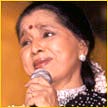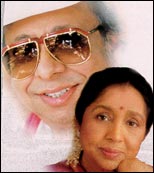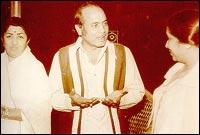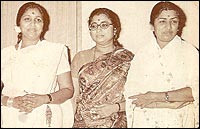
|
Asha at 70
A tribute to the original spice girl of Indian music
|
Dr Rajiv Vijayakar
In the history of Indian music, September 8 will always be written in --- as the cliche goes --- golden letters. That is the day Asha Bhosle was born.
Looking at how Asha's voice sits so pat on Kareena Kapoor (Mujhse Dosti Karoge), Amisha Patel (Kaho Naa... Pyaar Hai, Kranti), Shamita Shetty (Mere Yaar Ki Shaadi Hai), and Gracy Singh (Lagaan), it seems incredible that the singer has entered the 70th year of her chequered life.
Asha, for all the (elder sister) Lata Mangeshkar shadow-play on her career throughout the 1950s, 1960s, even 1970s, is the original spice girl of Indian music, hobnobbing with Helen, sizzling with Zeenat Aman, teeny-bopping with Twinkle Khanna, aligning with Ustad Ali Akbar Khan, cavorting with Code Red... then settling down to an exquisite ghazal album or bhajan sangraha after a remix or regional music of all genres!
From English to Malayalam, she has sung in all languages. Three composers --- O P Nayyar, S D Burman and R D Burman in chronological order of relevance --- shaped and chiselled Asha's vocal edifice and polished her singing style to project her as a distinct and disparate entity from Asha's original Geeta Dutt role model.
Nayyar gave the swing, Dada the substance, and Pancham the challenges. But to say that these three giants were the raison d'etre behind Asha's long career is an insult to Asha's expertise and steely determination --- the real reason why she etched out her identity in Lata's hegemony when others failed.
Today, we examine the equally important, if quantitatively lesser, role that other composers --- big and small --- played in Asha's annals.
The key difference between the two sisters who have so decisively dominated our film music is, Asha never distinguished between small and big, either banner or composer. She did not look down on Western influences, never was obsessed with nostalgia and always looked at healthy change as something to be encouraged. She was thus accessible to the humblest and the youngest music director in the business, ready to boost their careers with her presence and artistry.
Asha put in the same hundred per cent in Daan Singh's beautiful Sunate hain sitaren raat bhar (My Love), in the 1970s as she did in Sandeep Chowta's Kambakth ishq (Pyaar Tune Kya Kiya), in 2001.
The world knows of Madan Mohan's personal bond with Lata, but when she refused to sing for his debut film Ankhen, Asha helped out. Similarly, if Sadhana was one of the many heroines who insisted on Lata, it was Asha who sang for her debut film Love In Simla under small fry music-maker Iqbal Qureshi.
But the two standout cases of Asha with newcomers were Taxi Taxie (numerology in 1977!), and Naqab. The first marked the beginning of her son Hemant's shortlived tryst with music direction, and Asha seemed to put her entire being into Laayi kahaan yeh zindagi.
In Naqab, the very musical Raj Khosla entrusted a humble music teacher Kamaal Makhdoom, rather than his favourites Laxmikant Pyarelal with the music score due to severe budgetary constraints. When she heard the songs, Asha told Khosla, 'If you promote this music well, it will be another Umrao Jaan.'
 Tragically, several (political) reasons ensured that this exquisite score never even got normal publicity; the film's failure did the rest. Those lucky enough to have heard the music cherish Na kisika dil mujhe chahiye, Naina lad gaye (with Suresh Wadkar), Jaaneman jaan-e-jahaan and the title song as treasured memories that sound as fresh 13 years later.
Tragically, several (political) reasons ensured that this exquisite score never even got normal publicity; the film's failure did the rest. Those lucky enough to have heard the music cherish Na kisika dil mujhe chahiye, Naina lad gaye (with Suresh Wadkar), Jaaneman jaan-e-jahaan and the title song as treasured memories that sound as fresh 13 years later.
Today, the bratpack composers automatically work with Asha before the elder sister. Her forward-thinking, ever-young personality helps melt most of their apprehensiveness at approaching her. Viju Shah thus tried her out in Aar Ya Paar and Chhal, Dilip Sen-Sameer Sen in Aaina and Zulmi, Karthik Raja in Grahan, and Jatin-Lalit in Dilwale Dulhania Le Jayenge, Pyaar Koi Khel Nahin, Pyaar To Houna Hi Tha and Return Of Jewel Thief.
As for the Lata-obsessed Vishal Bharadwaj, he too needs that special voice in Satya and Love Ke Liye Kuchh Bhi Karega --- it is Ram Gopal Varma's fatwa, you know!
Speaking of Varma, one of the main reasons why Asha remained so much in the didi shadow was that few big-name filmmakers were loyal to her, unless they were already aligned to Burman or Nayyar. Only B R Chopra and, to an extent, Prakash Mehra in the later phases were Asha loyalists among the big names.
Asha's association with Chopra, Nayyar's Naya Daur apart, largely composed of a bunch of Ravi memorabilia like In hawaaon mein (Gumrah), Aage bhi jaane na tu (Waqt), Zindagi ittefaq hain (Aadmi Aur Insaan), and Uljhan suljhe na (Dhund), representing the creme de la creme.
 N Dutta added his Main jab bhi akeli (Dharam Putra), and the Mahendra Kapoor-Asha duet Dhadakne lagi dil ke taaron ki duniya (Dhool Ka Phool). Much later, Salil Choudhury came up with one of his very rare Asha hits, Jaaneman jaaneman (with Yesudas), in Chhotisi Baat.
N Dutta added his Main jab bhi akeli (Dharam Putra), and the Mahendra Kapoor-Asha duet Dhadakne lagi dil ke taaron ki duniya (Dhool Ka Phool). Much later, Salil Choudhury came up with one of his very rare Asha hits, Jaaneman jaaneman (with Yesudas), in Chhotisi Baat.
With Ravi, Asha Bhosle had an affectionate liaison right from the composer's debut Vachan, in which she co-warbled the kiddo number Chandamama door ke. Zindagi mein pyaar karna, Sheeshe se pee and Sun le pukar were the cheese-chutney-caramel variety spread in the raging hit Phool Aur Patthar.
Ravi also composed the awesome Tora man darpan kehlaaye (Kaajal), easily one of Asha's ten finest songs of all time, apart from a chain of beauties in films as varied as Yeh Raaste Hain Pyar Ke, Chaudhvin Ka Chand, Aaj Aur Kal, Nartaki, Ek Phool Do Mali and others.
Notes a musicologist, 'Asha was also hampered by a mindset among music directors that her voice was more suited to mujras and cabarets.' Agrees veteran composer Anandji, "This is why we broke the mould by giving her O saathi re tere bina bhi kya jeena in Muqaddar Ka Sikander."
Of course K-A knew that Asha was supreme in the Western idiom of Husn ke lakhon rang (Johny Mera Naam), Yeh mera dil (Don), and Udi baba (Vidhaata). But they also went on to do a bevy of scintilla for her, especially duets like Aankhon aankhon mein hum tum (Mahal), Kasam na lo koi humse (Bombay 405 Miles), Hum do mohabbat ke maare (Joru Ka Ghulam), which were all with Kishore Kumar, and the very Middle Eastern Chal diye tum kahaan (Ek Kunwari Ek Kunwara), with Mohammed Rafi.
 So it was that Madan Mohan (but for a rare Jhumka gira re in Mera Saaya), Chitragupta (Jodi hamari with Manna Dey in Aulad), and Naushad (Ek baat kahoon in Amar, Tora man bad paapi in Gunga Jamuna), rarely gave Asha her due. And, by extension, classicists Vasant Desai and S N Tripathi too shied away from giving her any weightage.
So it was that Madan Mohan (but for a rare Jhumka gira re in Mera Saaya), Chitragupta (Jodi hamari with Manna Dey in Aulad), and Naushad (Ek baat kahoon in Amar, Tora man bad paapi in Gunga Jamuna), rarely gave Asha her due. And, by extension, classicists Vasant Desai and S N Tripathi too shied away from giving her any weightage.
Happily, there were exceptions. C Ramachandra saddled Asha with Mr John (Baarish), Eena meena deeka (Asha), in the hep department. He also gave her pith like Dekh hamnein awaaz na dena (with Rafi in Amar Deep), and some lovelies in Talaaq, apart from composing his classic Ae mere watan ke logon with Asha's range in mind.
The same was true of Hemant Kumar (Samraat, Shart), for whom Asha has sung some exquisite numbers like Sapne suhane (Bees Saal Baad), and Kyoon mujhe itni khushi de de and Bheegi bheegi fizaa (Anupama), and Khayyam, who had a great outing with Asha both before (Phir Subah Hogi), and after (a ghazal album) the landmark Umrao Jaan.
Of course, all these great ditties that went Asha-wards were of the typical kind earmarked for her!
It took Roshan, Shanker-Jaikishan and Laxmikant Pyarelal to look beyond and reward that so-malleable throat with some
truly great 'normal' songs despite being strongly Lata-oriented.
Roshan created beauties like Hum intezaar karenge (Bahu Begum), Nigahen milane ko jee and Parda uthe salaam ho jaaye (Dil Hi To Hai), Inn bahaaron mein akele (Mamta), and Mere beri ke ber mat todo (Anokhi Raat), for that wonderful voice.
Shanker-Jaikishan spun magical melodies for Asha's supple throat like Mud mud ke na dekh (Shree 420), the Rafi-Asha duets Dilruba dil pe tu (Rajkumar), and Raat ke humsafar (An Evening In Paris), Paan khaaye saiyyaan hamaaro (Teesri Kasam), Hare kaanch ki chudiyaan from the film of that name, Parde mein rehne do (Shikar), Mere ang lag jaa baalma and Daag na lag jaaye (Mera Naam Joker), Re man sur mein gaa and Sooni sooni saans ke sitar par (Lal Patthar).
L-P, who recorded more songs with Lata than any single music director-singer combo in Hindi films, still could not bypass Asha in
nuggets that included the playful Khat likh de (Aye Din Bahaar Ke), the swinging Hungama ho gaya (Anhonee), the soulful lullaby Mere soone jeevan ka aasra (Aasra), the seductive Bujha do diye (Kaala Aadmi), the rustic Phoolwati ka gajara (Krodhi), the semi-classical Bansuri tihari Nandlal (Sajan), and duets like Chudiyaan bazaar se (Suhana Safar), with Rafi and Jaipur ki choli (Gehri Chal).
There were a myriad other music men in the Asha 'hit list' --- as diverse as Jaidev (Abhi na jaao with Rafi in Hum Dono), Sonik-Omi (Raaz ki baat with Rafi in Dharma), Sapan-Jagmohan (Tumhi rehnuma ho in Do Rahe), Ravindra Jain (Sajnaa hai mujhe in Saudagar, and the hits of Chor Machaye Shor).
Some, like Bappi Lahiri (Namak Halaal, Haathkadi, Zindagi Ek Juaa, Aitbaar), Rajesh Roshan (Julie, Priyatama, Mr Natwarlal, Lootmaar, Jaag Utha Insan, Khoon Bhari Maang), and Usha Khanna (Dil Deke Dekho, Hawas, Honeymoon, Ab Kya Hoga), had a fairly significant role to play in Asha-land in the sizzling seventies and eccentric eighties, while A R Rahman (Rangeela, Taal, Thakshak, Lagaan), instilled fresh vitality in the Asha of the 1990s and the millennium.
And the sweet seventy singer sings on.
The Lata-Asha Connection
|
|
Since the sisters were hyped as arch rivals, this is a list of a few truly memorable competitions between them at the microphone in those days of 'live' recordings. Note the fact that Lata-Asha sang nothing significant for Dada Burman and only remix fodder like Main chali for R D Burman (Padosan).
Off the cuff, the significant Lata-Asha contest in contemporaray music included Roshan's Pad gaye jhoole (Bahu Begum), Naushad's Mere mehboob mein kya nahin (Mere Mehboob), Shanker-Jaikishan's Hamre gaon koi aayega (Professor), and Manbhaavan ke ghar (Chori Chori), and Laxmikant-Pyarelal's Man kyoon behka and Neelam pe nabh chhayi (Utsav), Chhap tilak (Main Tulsi Tere Aangan Ki), and Ae kaash kisi deewane ko (Aye Din Bahaar Ke).
Moral of story: the Asha bhakts dared not pit their fave singer with her sister, but the others made her score on Lata homeground!
| |